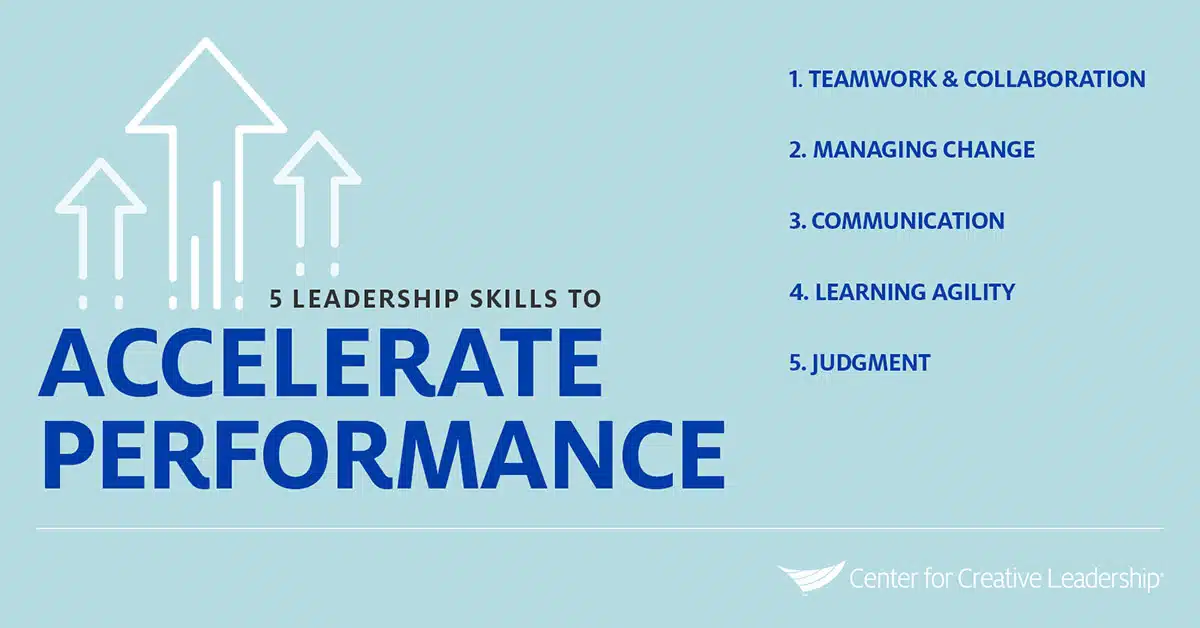How Do Leadership Skills Improve Professional Performance?
“Leadership is like a muscle. The more intelligently you train, the stronger you get.” This quote from our former president sums up exactly why we’re believers in giving leaders a serious workout.
Based on our research and practical experience, we advise senior leaders to step up leadership skills training to improve professional performance, particularly in these 5 key areas:
- Teamwork and collaboration;
- Managing change;
- Communication;
- Learning agility; and
- Strategy and people judgment.
That’s because these are among the most critical senior leadership skills needed by senior executives.
Hone These 5 Leadership Skills to Improve Your Professional Performance
1. Teamwork and Collaboration.
Effective teamwork and collaboration is critical for organizations in 2 ways.
Internally, you won’t get much done without it. Externally, you need partnerships with like-minded organizations that advance your strategy, whether it’s developing new products or breaking into emerging markets.
But fostering teamwork isn’t easy. In a recent study, 97% of senior executives told us that collaboration is a key factor in organizational success. But less than half believed the leaders in their organizations are skilled collaborators.
2. Managing Change.
In our work, we’ve found a few key principles for tackling change.
First, view change positively and with a sense of urgency. There’s no point in fearing change since it’s inevitable and we can’t control it.
Second, focus on adapting plans to external pressures as necessary. During difficult times, some organizations stubbornly stick with their plans, believing things will return to normal, but it’s wiser to recognize a sea change and adjust your performance plans accordingly.
Third, it’s important to manage the resistance to change from your colleagues. It’s your role and responsibility to help them understand what’s going on externally and why your organization needs to adapt. Be sure to involve others in the design and implementation of major change initiatives, whether it’s a workforce restructuring or a new product development process. This is part of becoming a successful change leader.
3. Communication.
As an executive with a demanding schedule, it’s easy to be cut off from the rest of the organization.
We can all learn a lesson from A.G. Lafley, the retired CEO of Procter & Gamble. He was a great listener, often visiting consumers in their homes or joining them for trips to the store. In addition to being P&G’s CEO, Lafley also established himself as the company’s Chief Listening Officer. He knew that getting good ideas required asking people for input and listening very carefully.
We should all be Chief Listening Officers in our own organizations. (Learn more about the importance of active listening to coach others.)
4. Learning Agility.
To succeed in a world where our work is always changing, where challenges are unpredictable, and where competition abounds, we need to be agile learners. We need to apply our new knowledge. Perhaps most of all, we need to believe we can rise to the challenge.
There’s a growing body of neuroscience research that says we can learn new behaviors and modify deep-set behaviors at any age. It takes hard work and real focus, but all of us really can learn new and effective behaviors — and help take our organizations to new levels of performance. Great leaders are truly great learners.
5. People and Strategy Judgment.
Good judgment is at the core of leadership. Fundamentally, judgment is about getting the most important calls right — when it comes to both people and strategy.
Without good people judgment, your team’s performance will suffer. Without a strong team, your strategy will not be executed effectively. Look first for people who have demonstrated high performance, integrity, and the desire to assume greater levels of responsibility. Watch out for candidates who treat others insensitively and abrasively. They are likely to put their self-interest above the larger good.
Effective strategy judgment calls require leaders to find new paths. Success depends on asking the right questions, experimenting, and constantly adjusting your approach. It hinges even more on your level of humility. You need the humility to understand that even with great collaboration, you won’t get everything right, and you can’t know everything yourself.
To evaluate yourself on this key skill and its impact on performance, ask yourself: Am I too confident in my own judgment? Do I believe too strongly in our old ways of doing business? Do I think that because something has worked many times before, it will work again now?
Remember, senior leaders who take the time to reflect on their experiences and work on their leadership skills to improve professional performance are more likely to be seen as effective.
Ready to Take the Next Step?
Now that you know how leadership skills improve professional performance, advance your career and sharpen your skills. Explore our executive leadership courses for senior leaders.









